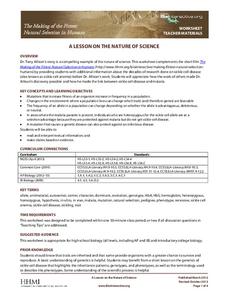Curated OER
Science Fair With An Energy Efficiency Flair
In order to learn more about energy conservation, pupils work to promote energy efficiency by participating in a school-wide science fair with an emphasis on energy conservation. In addition to displaying their projects, learners invite...
Virginia Department of Education
Classification of Organisms
Searching for the perfect indoor/outdoor activity that allows class members the opportunity to learn about organism classification? Here, pupils research organisms and categorize them according to domain and kingdom over the course of...
Curated OER
Animal Structure and Function
Take a look at the levels of organization and methods of homeostasis in living things. This worksheet requires biology enthusiasts to list categories of animal tissues, connective tissues, and muscle tissues. It has them order the levels...
NOAA
Tides
Sometimes low, sometimes high, but always in motion! Explore Earth's tidal system in the 10th interactive in a series of 13. Engaging life and earth science students alike, the versatile resource demonstrates cause and effect between...
NOAA
What Little Herc Saw
See the underwater world through a different pair of eyes! Middle school marine biologists identify deep-sea organisms by examining images taken by an ROV from the Okeanos Explorer. After determining what creatures lie beneath the...
Curated OER
Energy, Matter, and Organization
Tenth graders review the Energy, Matter, and Organization unit. They have one week to complete an essay. Students must submit a concept map or drawing. The activity is introduces by reading a short story line which presents a simple...
Curated OER
Grade Improvement Options for Organic Chemistry - MCAT Exam Questions
The first two pages of this resource may not be useful as they contain a narrative as to how someone can improve their grade on an organic chemistry exam. The final page, however, contains four sample MCAT exam questions. You could use...
Curated OER
Organic Mechanic Part I
On day one of the "Organic Mechanic Part I" lesson, learners try to remove the waxy coating of an apple and consider pesticides that may be represented by this addition to our food. On day two, they research pesticides online and...
Curated OER
Genetically Modified Organisms
High Schoolers complete a variety of activities as they examine the ethics of (and take a position concerning) genetically modified organisms in the field of agriculture. They complete a PowerPoint demonstration to go along with the unit.
Curated OER
Graphic Organizer: Research Note Taking Made Easy
What do you wonder about bats? Use an open-ended question like this to engage your class and interest them in an upcoming research project. There's a list of example questions to offer or suggest regarding bats, but see what they can...
Curated OER
Impersonating Great Poets Using "Science Verse" by Jon Scieszka
A great way to bring poetry and parody into your language arts classroom, this lesson mimics famous poems based on Jon Scieszka's Science Verse. The activity not only allows the class to see examples of poem parodies, but to create their...
Curated OER
Organic Compounds
Your young biologists will find these slides very useful to help differentiate between the different nutritional components. The slides contain step by step details of the different levels of structure and function. These would be...
University of North Carolina
Sciences
Science writing follows many of the same principles as writing in language arts, but some structural details differ. Individuals read an online science handout that covers how to write with precision, choose appropriate details, and use...
Howard Hughes Medical Institute
A Lesson on the Nature of Science
If you are looking for a great way to present natural selection in humans, look no further. This handout is intended to accompany the 14-minute video The Making of the Fittest: Natural Selection in Humans, which can be found on the...
Kenan Fellows
Determining Stream Health by the Diversity and Types of Benthic Organisms
How diverse are the benthic organisms found in local streams? Using the information learned in previous lessons on identification of macroinvertebrates and on calculating stream index values, groups determine the health of local streams....
NOAA
Deep-Sea Ecosystems – Life is Weird!
A pool of brine in the deep sea can be up to four times as salty as the surrounding sea water. The deep sea ecosystem relies on chemosynthesis and the organisms that live there are often strange to us. The lesson focuses on researching...
Science 4 Inquiry
The Classification of Living Things
It's a classification sensation! Demystify why we classify using an inquiry activity that helps your class sort things out. Groups begin by classifying a variety of shoes before they research organisms and design their own dichotomous...
Curated OER
The Marvels of Mud
Young scientists roll up their sleeves and get a little dirty in this three-day earth science investigation. Following the scientific method, children monitor the growth of algae in pond water samples in order to determine the role that...
Kenan Fellows
Use of Dichotomous Keys to Identify Stream Organisms
What kind of organisms are living in the stream? After an explanation on how to use a dichotomous key, groups of three to four use the keys to identify macroinvertebrates from a local freshwater stream. Using the the concept of Stream...
Cornell University
Glued into Science—Classifying Polymers
Explore the unique characteristics of polymers. A complete lesson begins with a presentation introducing polymers. Following the presentation, young scientists develop a laboratory plan for creating substances using polymers. They test...
Berkshire Museum
Meet a Naturalist: Researching, Writing, Interviewing
Young scholars reach out into the community and learn about different environmental science careers in this inquiry-based instructional activity. Beginning with a short research assignment, children gain background knowledge about...
American Physiological Society
Effects of Environment on Enzymes
Much like the tale of Humpty Dumpty, proteins, once altered, will never be the same again. Honors and pre-AP biology classes explore the delicate world of enzymes via a Webquest and lab experiment. The teacher's guide contains all...
Curated OER
Skin as an Organ
Young scholars are introduced to human skin as an organ of the body with many roles, functions and interactions with other organs. They investigate the integumentary system in groups and complete a worksheet with their findings.
Curated OER
Grade 8 Science written test
In this science worksheet, 8th graders complete multiple choice questions on plant and animal cells, organisms, planets, and more. Students complete 70 questions.

























